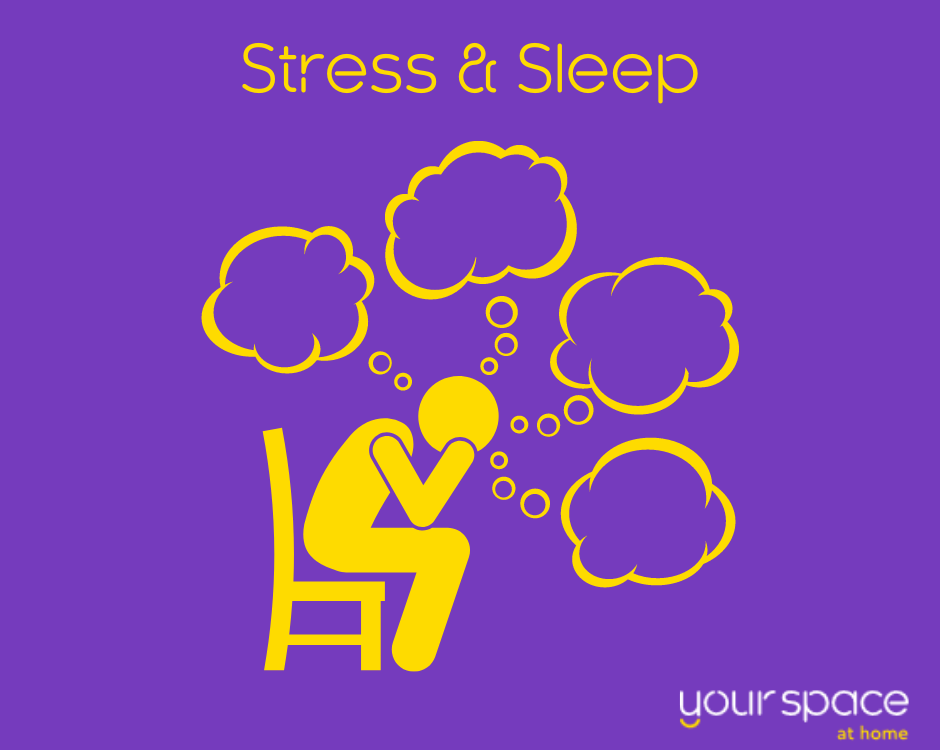Stress & Sleep
Posted on Nov 30

In today’s world, there’s a lot to worry about. Stress affects your body in many ways but one of the most impacted areas is sleep.
Stress hormones like cortisol, adrenaline and even dopamine can be elevated during periods of stress, and they can remain elevated for some time, even after the stressor is gone. So once you get riled up about something — work, family issues, a pandemic — it can be hard to physiologically “come down” from that stressed state.
Most people recognise that not being able to fall asleep is often related to stress -
You've had 8 hours sleep but feel like you haven't slept at all
Ever wake up after a full night of sleep feeling totally drained? That could be a sign your sleep quality is suffering due to stress. When we are in fight-or-flight mode, our body is not able to access our rest-and-digest mechanisms that help us relax. This response is designed to protect us from danger but can be frustrating when we can’t get restful sleep.
You're having weird dreams
They might even be nightmares. In times of heightened stress, the limbic system (the brain’s primary emotion and memory centre) has more demands to process. Because our brain likes order, it attempts to digest, organise, and integrate all of this stimulation (our thoughts, stressors and experiences) into narratives. Enter: colourful, strange, stressful and possibly scary dreams.
Your memory is non existent and you have zero motivation
Sleep is a time for your body to heal itself and prepare for the next day. But when you don’t get proper sleep, your body an your brain can’t repair the way they're supposed to. It cannot form the pathways that help you learn, remember and grow cognitively. This is why your memory is often worse the day after a poor night’s sleep. Similarly, fatigue due to stress-related sleeplessness can also rob us of our motivation to engage in healthy behaviours, like cooking and exercising.
You keep getting ill
When you’re not sleeping well, your body has a more difficult time fighting off infection and illness. Your immune system is hard at work when you sleep, defending your body against pathogens and recharging itself. Lack of sleep may lead to more frequent colds and other illnesses.
You're waking up more during the night
When we’re in fight-or-flight mode, our body is not able to relax because it feels that we are in some sort of danger. Even if we do manage to fall asleep, stress hormones hanging out longer than they should can trigger random wakeups.
You can't seem to get a lie in
There’s nothing quite as frustrating as planning to sleep in to catch up on your hours, only to wake up at the crack of dawn. If you notice that you wake up before your alarm goes off and your mind immediately starts to race, this is a good indicator that your sympathetic fight-or-flight system is activated by stress.
You're always hungry
A stress-related lack of sleep can also mess with the hormones that control hunger and blood sugar levels. This is why lack of sleep can lead to cravings and overeating. If you’re suddenly having a hard time managing your weight and you’re also stressed and not sleeping well, these three factors could be related. Getting enough sleep is key to eating healthier and managing your weight.
How can we sleep better when we are stressed?
Check out our "How to Sleep Better" blog here
- Stay active during the day. Staying active helps stimulate something called adenosine, which builds sleep pressure, so fitting in a heart rate-boosting sweat session is a good idea. If you’re pressed for time, try the Your Space at Home HIIT Workout here - https://www.yourspaceathome.com/video/hiit-workout
- Create a wind-down routine. Taking a warm bath or shower 60–120 minutes before bed could help you fall asleep faster. It reduce your core body temperature, which is necessary for sleep. Though it sounds counterintuitive, this process of passive body heating helps heat from the body’s core rise to the surface, which has a natural cooling effect.
- Find a sleep mantra. If you’re struggling to fall asleep or stay asleep, a go-to calming phrase can be a lifesaver. Having some sort of mantra like ‘I am safe and I am OK’ communicates to our brain and body that it is OK to relax and go to sleep. Another middle-of-the-night strategy that can provide relief is to tell ourselves that our future selves can handle any situation in the morning.
- Schedule worry time. Many people experience their worst worries about the day’s events right before bed. Thirty minutes of daily scheduled ‘worry’ time may help to reduce insomnia symptoms. Schedule your worry period for the same time each day, in the morning or afternoon. During that time, write down all the worries that come to mind. Don’t pressure yourself to ‘solve’ anything. Instead, focus on listing one small step toward reducing that worry, even if the worry feels large.
At the end of each week, look for themes and patterns in your worries. Repeat this process, even after you start to feel better. With sustained practice, like a muscle that strengthens with weight training, you’ll notice increases in your cognitive ‘strength’ to restrict, contain and control worry.